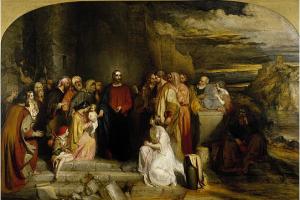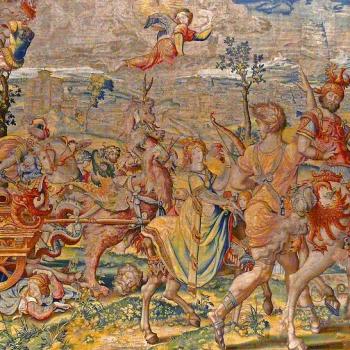
Knowledge is a good, but like every other good, it can be abused. People can desire it for the wrong reasons, such as those who accumulate facts to make themselves look smarter, wiser, indeed holier than they are. We must do more with our lives than simply learn. We must act upon what we have learned, with the caveat that we do so with proper humility and love:
Those who merely grasp at knowledge are themselves grasped by pride: the more they study, the more darkened they become. But in the case of those whom knowledge enters and resides in their very stirrings, these people will lower themselves to the depths of humility, and they receive in themselves a luminous way the conviction that gives joy. [1]
Many show off their knowledge as a way to gain positions of honor and authority when they are worthy of neither. St. Gregory the Great saw many trying to gain ecclesiastical authority in this fashion; people wanted to become teachers in the church without being worthy of holding such a position of power because they knew it would give them a place of prominence in society:
They desire to appear as teachers, they covet superiority to others, and, as the Truth attests, they seek the first salutations in the market-place, the first rooms at feasts, the first seats in assemblies, being all the less able to administer worthily the office they have undertaken of pastoral care, as they have reached the magisterial position of humility out of elation only. For, indeed, in a magisterial position language itself is confounded when one thing is learned and another taught. Against such the Lord complains by the prophet, saying, They have reigned, and not by Me; they have been set up as princes, and I knew it not. For those reign of themselves, and not by the Will of the Supreme Ruler, who, supported by no virtues, and in no way divinely called, but inflamed by their own desire, seize rather than attain supreme rule. [2]
It is far better to have humble people who live out their faith with integrity and love than it is to have prideful prelates who want to be fawned over and adored leading the church. This is also true in regards other positions of authority and honor in society. Certainly, we should not expect people to be perfect, but those who want positions of power should do so because they desire to promote the common good with a charitable heard and not because they think it will allow them to fulfil all their private desires at the expense of the common good. They should also have some level of knowledge and wisdom, so that they can teach as they try to guide society, but of course, that means they should also serve as examples of what they expect from society:
Every teacher ought to have a zeal for good action and good preaching; for either without the other does not make for perfection, but a just person begins by doing the good, so that good teaching might follow.[3]
But, when talking about those who teach others, especially if they do so in a position of ecclesiastical authority, it is important they keep their audience in mind and actually engage their audience in a way which it can relate:
This means, they should be able to relate to their audience, to speak and think like they do, so that they can effectively help people where they are at, A teacher who is full of wisdom stammers along with his stammering young students. But the teacher’s stammering does not come from a lack of learning; it is a sign of the concern he feels toward the children. In the same way, Christ did not do these things because of the lowliness of his essence. He did them because he was condescending and accommodating himself to us.[4]
This is one of the things which tends to be avoided by those who like to promote themselves and their learning; they like to show off what they know and they feel they cannot do that if they have to limit themselves to the abilities of their audience. They like to use vocabulary and concepts which their audience does not know or understand, not only to suggest their intellectual superiority to their audience, but to make sure few, if any, will be able to contend against them and what they have to say. Certainly, such knowledge and concepts have value, but how they are engaged and disseminated are vital, lest they become lost in obscurity.
A great teacher, a great Christian leader, not only should live out what they have learned, not only should be able to express it in a way to meet the needs of their audience, they should be constantly learning, so that they will have more to share. As St. Gregory the Great said, they should be transcending themselves, always learning more. They should, if they can, be engaging practices like mystical contemplation, practices which hopefully will also help them come to know more through their experiences, but they should make sure they do not get lost in such mystical contemplation, in such transcendence, so that they do not lose sight of the world at large and life in general. Using Paul as his example, St. Gregory explained the way a good Christian teacher will balance both out:
In contemplation he transcends heaven, and yet in his anxious care deserts not the couch of the carnal; because, being joined at once to the highest and to the lowest by the bond of charity, though in himself mightily caught up in the power of the spirit into the heights above, yet among others, in his loving-kindness, he is content to become weak. Hence, therefore, he says, Who is weak, and I am not weak? Who is offended, and I burn not? . Hence again he says, Unto the Jews I became as a Jew . Now he exhibited this behaviour not by losing hold of his faith, but by extending his loving-kindness; so as, by transferring in a figure the person of unbelievers to himself, to learn from himself how they ought to have compassion shown them; to the end that he might bestow on them what he would have rightly wished to have had bestowed upon himself, had he been as they. Hence again he says, Whether we be beside ourselves, it is to God: or whether we be sober, it is for you . For he had known how both to transcend himself in contemplation, and to accommodate himself to his hearers in condescension.[5]
To be sure, the greatest example of a teacher, of a leader with authority, is Christ himself, who in the incarnation, emptied himself and became humble and lowly, so that he could and would address everyone where they are at, and in that address, show them the love God has for them and the desire God has for them to participate in the divine life themselves.
The wisdom of all of this applies to all of us to various degrees. Hopefully, we are all learning throughout our lives. Hopefully, we are all engaging others, often trying to help them learn what we have learned. We should always do so with humility and patience. We should strive to find a way to relate what we have learned with our audience. It is not always easy. We might not know what they know or are ready to comprehend. The key is to be flexible, and to share out of the goodness of our heart, and not to show ourselves off to others, to make ourselves look great, because only then will the knowledge be able to be put to good use.
[1] St. Isaac of Nineveh, Headings on Spiritual Knowledge (The Second Part, Chapters 1-3). Trans. Sebastian Brock (Yonkers, NY: St Vladimir’s Seminary Press, 2022), 74-5 [Chapter 3; First Discourse].
[2] St. Gregory the Great, Pastoral Rule. Trans. James Barmby, DD in NPNF2(12): 1-2.
[3] St. Isidore of Seville, Sententiae. Trans. Thomas L. Knoebel (New York: Newman Press, 2018), 187.
[4] St. John Chrysostom, On the Incomprehensible Nature of God. Trans. Paul W. Harkins (Washington, DC: CUA Press, 1982), 248 [Homily 10].
[5] St. Gregory the Great, Pastoral Rule, 13.
Stay in touch! Like A Little Bit of Nothing on Facebook.
If you liked what you read, please consider sharing it with your friends and family!
N.B.: While I read comments to moderate them, I rarely respond to them. If I don’t respond to your comment directly, don’t assume I am unthankful for it. I appreciate it. But I want readers to feel free to ask questions, and hopefully, dialogue with each other. I have shared what I wanted to say, though some responses will get a brief reply by me, or, if I find it interesting and something I can engage fully, as the foundation for another post. I have had many posts inspired or improved upon thanks to my readers.

















